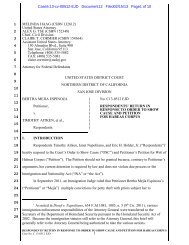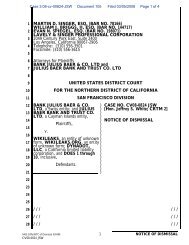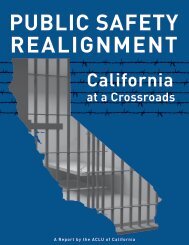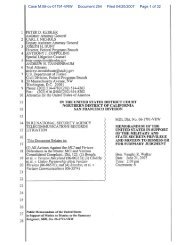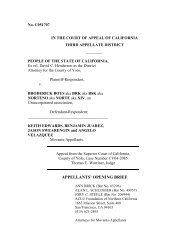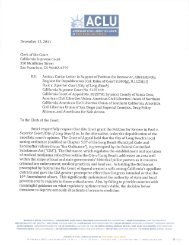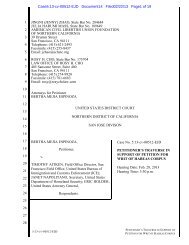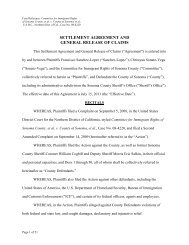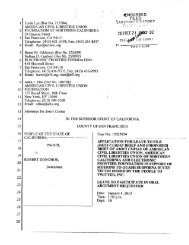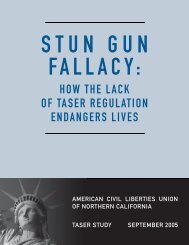Petition for Review - California Courts - State of California
Petition for Review - California Courts - State of California
Petition for Review - California Courts - State of California
Create successful ePaper yourself
Turn your PDF publications into a flip-book with our unique Google optimized e-Paper software.
Despite these precedents, the First Appellate District erroneously<br />
held that the state’s desire to “preserve[e] the institution <strong>of</strong> marriage in its<br />
historical opposite-sex <strong>for</strong>m” is a legitimate state interest. (Opn. at p. 59.)<br />
If mere deference to past practices or to history alone were sufficient to<br />
provide a legitimate basis <strong>for</strong> differential treatment, however, disfavored<br />
groups would have no protection against even the most irrational or<br />
arbitrary treatment. As the trial court in this case held: “The <strong>State</strong>’s<br />
protracted denial <strong>of</strong> equal protection cannot be justified simply because<br />
such constitutional violation has become traditional.” (AA at p. 113.)<br />
In addition, the First Appellate District held that, while<br />
“[m]ajoritarian whims or prejudices will never be sufficient to sustain a law<br />
that deprives individuals <strong>of</strong> a fundamental right or discriminates against a<br />
suspect class,” mere deference to majority will is a legitimate state interest<br />
under rational basis review. (Opn. at p. 61.) This Court should grant<br />
review to clarify that, under any level <strong>of</strong> scrutiny, a majority’s bare desire<br />
to retain a right or privilege <strong>for</strong> itself alone is never a legitimate public<br />
interest. Were it otherwise, no statute could ever be invalidated under<br />
rational basis review because it always would reflect the majority’s desire<br />
to preserve a particular <strong>for</strong>m <strong>of</strong> discrimination, however arbitrary or unfair.<br />
(See, e.g., City <strong>of</strong> Cleburne, supra, 473 U.S. at p. 448 [holding that even<br />
under rational basis review, the government “may not avoid the strictures <strong>of</strong><br />
[the Equal Protection] Clause by deferring to the wishes or objections <strong>of</strong><br />
some fraction <strong>of</strong> the body politic”].)<br />
If the First Appellate District’s toothless <strong>for</strong>mulation <strong>of</strong> the rational<br />
basis test were allowed to stand, and the state hence<strong>for</strong>th were permitted to<br />
justify classifications based solely on a desire to maintain a “historical”<br />
distinction or on mere deference to the majority’s desire to discriminate,<br />
there would be no meaningful limit on the state’s legislative power nor any<br />
18



